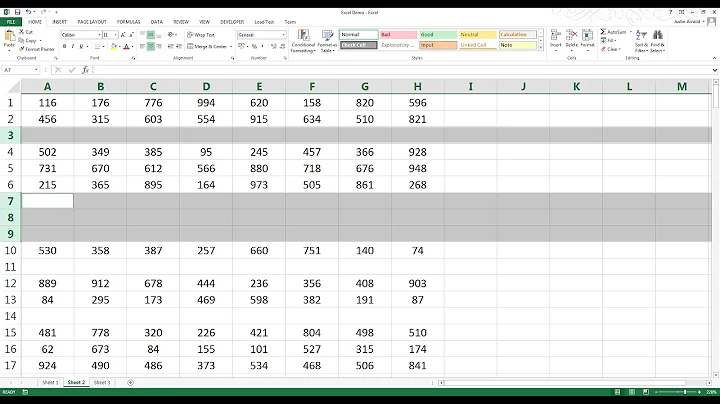Remove Leading or Trailing Space(s) in File or Folder Names
Solution 1
To remove any number of leading spaces from file names you can use
rename(prename) :rename -n 's/^ *//' *To remove any number of trailing spaces from file names you can use
rename(prename) :rename -n 's/ *$//' *Remove
-n(dry-run) if you are satisfied with the file names.To remove files or folders that are empty (recursively) :
find . -emptySatisfied ? Let the action take place :
find . -empty -deleteOnly in the current directory :
find . -maxdepth 1 -empty -deleteAlso use
-type ffor only files and-type dfor only directories if you want.
Read man rename and man find to get more idea.
Solution 2
I often forget about rename. Here's how to do it with plain bash:
$ touch " leading spaces" "trailing spaces "
$ printf ">%s<\n" *spaces*
> leading spaces<
>trailing spaces <
$ shopt -s extglob
$ for f in *spaces*; do
new=${f##*([[:blank:]])} # remove leading whitespace
new=${new%%*([[:blank:]])} # remove trailing whitespace
mv "$f" "$new"
done
$ printf ">%s<\n" *spaces*
>leading spaces<
>trailing spaces<
Related videos on Youtube
oldefoxx
Updated on September 18, 2022Comments
-
oldefoxx over 1 year
I worked out a neat way ro get rid of duplicate files. You know, the ones that contain "(1).", "(2).", "(3).", etc. in their names. In a terminal window, at the command line, you type in "rm "[backslash]").", but without the quotes. That will do it. The [backslash] "\" means the next character is accepted as just a character, not part of a pair of parentheses. This works when nothing else will. Incidently, I tried to type the "\" into the "rm" command, but it failed to display properly, so I put the term [backslash] there instead.
The appearance of "\ " in a folder or a filename shows the presence of a space there as well. The use of spaces in names is not all that common, unless you work with Windows. Windows just has you bracket the "whole path\file name" in double quotes. You can do that in Ubuntu as well, or just stick a backslash "\" in front of the space. But what if you want to replace the space with a different character instead? Like a hyphen or underscore? How would you do that for all folders and files at once?
Or what if you decide to just remove the spaces, just pack the rest of the characters together? How would you do that?
And here is a toughy: Just get rid or any leading or trailing spaces. even if there is more than one present.
And to wrap it up, how to detect and delete and files that are completely empty. Or folders that are empty.
-
 kos over 8 yearsYou asked about removing leading / trailing spaces but those
kos over 8 yearsYou asked about removing leading / trailing spaces but thosetrandrenamecommands 1. Don't do the same thing, one outputs the processed filenames tostdoutand the other actually rename the files 2. Delete all spaces. Thanks for reporting back, but if that's what you were asking for please edit your question to make this clear. Otherwise accept heemayl's or glenn jackman's answer, which both answer the question as-is-written perfectly. -
Sridhar Sarnobat almost 7 yearsI never knew about
-empty. That's useful whenrsynccreates junk empty files. -
 Thanh Nguyen over 3 yearsThanks for
Thanh Nguyen over 3 yearsThanks for-ndry-run!





